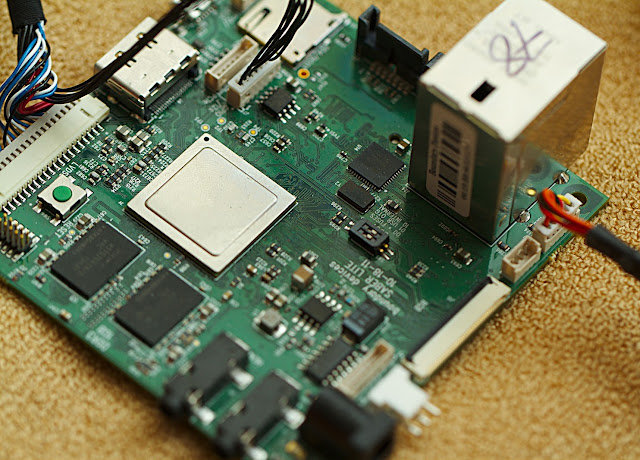Saul Wold, User Space Architect at Intel Open Source Technology Center, discusses the latest on the Yocto Project at the Embedded Linux Conference 2012. Abstract: The Yocto Project is a joint project to unify the world’s efforts around embedded Linux and to make Linux the best choice for embedded designs. The Yocto Project is an open source starting point for embedded Linux development which contains tools, templates, methods and actual working code to get started with an embedded device project. In addition, the Yocto Project includes Eclipse plug-ins to assist the developer. This talk gives a walk-through of the key parts of the Yocto Project for developing embedded Linux projects. In addition, features will be described from the latest release of Yocto. At the end of the talk, developers should be able to start their own embedded project using the Yocto Project and use it for developing the next great […]
Status of Embedded Linux – ELC 2012
Tim Bird, software engineer at Sony, discusses recent development in embedded Linux at the Embedded Linux Conference 2012. Abstract: Tim discusses changes to the kernel, improvements to embedded-related sub-systems, and new industry initiatives likely to affect embedded Linux developers in the future. Also, Tim discusses the direction of the Linux Foundation CE Workgroup, and their contract work and projects for this year. Last year highlights are also discussed, as well as ways to continue to improve Linux going forward. Here are the key points of this presentation: Linux Kernel Version changes: 2.6.38 to 3.3-rc3 Technology Areas: Bootup Time – With improvement in the kernel, bootloader and user-space Graphics – 2D/3D implementation. New /dev/ion and CMA graphics stuffs Accelerated Rendering – e.g. Renderscript Graphics Drivers – e.g. PowerVR Multimedia – Gstreamer, Android Media Layer (stagefright) and codec wars (e.g. patent issues with WebM/VP8 that interferes open source licenses). File systems – […]
Binary Blobs Attack – ELC 2012
Zach Pfeffer, Android Platform Lead at Linaro, talks about (GPU) Binary Blobs and the problems they cause at Embedded Linux Conference 2012. Abstract: Binary Blobs Attack!!! Most SoC vendors distribute binary blobs with Linux kernel shims. These binary blobs enable graphics engines, DSPs and other cores on ARM and other architecture SoCs. These binary blobs tend to be tied to specific kernel versions which limits unreadability and hackability and complicates device manufactures, which slows down innovation and the introduction of new and unique computing devices. Here’s what I noted from this presentation: Most of the issues at Linaro come from (GPU) Binary blobs, they delay projects and cause projects to cost more as FAE and more engineers must be involved in solving problems. Blobs are here to stay mostly due to legal reasons (patents). Binary Blob are usually OS independent, e.g. the same binary is used in Windows and Linux, […]
Low Cost Freescale iMX6 Quad Sabre Lite Development Board
i.MX6q SABRE Lite Board is a low-cost development platform based on Freescale Quad Core Cortex A9 i.MX 6Quad Application Processor. This will probably be the first low cost ARM quad-core development board to hit the market. Nvidia has previously announced the CARMA Tegra 3 CUDA Development Kit, but the price has not been announced and when I look at the picture of the board and the specs, “low cost” does not come to mind. Here are the technical specifications for the Sabre Lite board: Quad-Core ARM® Cortex A9 processor at 1GHz per core 1GB DDR3 @ 532MHz 3 display ports (RGB, LVDS, and HDMI 1.4a) Two camera ports (1xParallel, 1x MIPI CSI-2) Multi-stream-capable HD video engine delivering H.264 1080p60 decode,1080p30 encode and 3-D video playback in HD Triple Play Graphics system consisting of a Quad-shader 3D unit, and a separate 2-D and separate OpenVG Vertex acceleration engine for superior 3D, […]
Metaio To Introduce Augmented City Platform at MWC 2012
Metaio has unveiled plans to add 3D Object Tracking and Visual Search to its free mobile Augmented Reality SDK for Android and iOS, part of the Augmented City platform. This SDK is optimized by major ARM chipset providers, and assembles technologies necessary for creating interactive and immersive AR experiences, such as the overlay of virtual information on building facades, city streets and almost any 3D real world object or device, says the company. Metaio Mobile SDK is specifically optimized for Texas Instruments OMAP4460/4470 and ST Ericsson NovaThor processors using respectively PowerVR SGX540, SGX544 and Mali-400 GPUs. The metaio Augmented City platform consists of diverse mobile and web software packages that use computer vision technology to insert 3D and digital information into the real world. Whereas many existing Augmented Reality (AR) platforms limit experiences to GPS mapping and the anchoring of graphics to simple, 2D surfaces, metaio platform can deliver real-time […]
Linaro 12.02 Release with Kernel 3.3-rc
Linaro has just released version 12.02 based on Linux Kernel 3.3-rc and Android 4.0.3. Among the key points, they have started to work on Freescale i.MX6 SabreLite board, included libav 0.8 to Ubuntu images which provides up to 160% performance improvement while playing real-media videos and XBMC is available via PPA. Here are the highlights of the release: Android Linaro Android can now be built with current GCC 4.7 snapshots. A 4.7 based toolchain build preview is also available. Linaro Android can boot on iMX6 Sabrelite boards. All test result spreadsheets have been streamlined and are now easier to use. Bluetooth enablement have been completed for the Origen board. A Prototype of using camera on Snowball was made. Presentations Given by Linaro Android Team this cycle “Binary Blobs Attack!!!” – Embedded Linux Conference. “What Android and Embedded Linux can learn from each other” – Embedded Linux Conference. “Integrating Projects Using […]
Android Builder Summit and Embedded Linux Conference 2012 Videos
The Android Builders Summit and the Embedded Linux Conference took place on February 13-17 2012, in San Francisco. The Linux Foundation has now posted videos of the talks as well as presentation slides on their website. Android Builder Summit 2012 Buildbot and Gerrit Integration, Improved CI Automation Using Android Outside the Mobile Phone Space The Android Ecosystem Case Study of Android Ice Cream Sandwich Rapid Bringup Towards a Standard Audio HAL for Android Topics in Designing An Android Sensor Subsystem: Pitfalls and Considerations A Novel Approach to In-Vehicle Infotainment (IVI) Based on Android Android Services Black Magic The Case For Security Enhanced (SE) Android Hardware and Android App Testing & Tuning Exposing the Android Camera Stack Usable Hardware Security for Android on ARM devices Using OpenOCD JTAG in Android Kernel Debugging The AllJoyn Open Source Project ADB: (Android Debug Bridge) : How It Works Android OTA Software Updates USB Device […]
TI Dual Core OMAP 5 Cortex A15 (800 Mhz) Twice as Fast as Nvidia Tegra 3 Quad Core Cortex A9 (1.3 Ghz)
Texas Instruments released a video showing the Web page loading time between TI OMAP 5 featuring two ARM Cortex-A15 cores at 800MHz (as well as specialized cores and accelerators), compared to a commercial device powered by a quad-core ARM Cortex-A9 processor at 1.3 GHz. They did not say it, but it’s got to be the Nvidia Tegra 3 since this is the only ARM Cortex A9 Quad-core processor with products available on the market today. In this benchmark, the devices handle 3 tasks simultaneously: Rendering 20 web pages Downloading videos Play a MP3 file The result is quite amazing, even hard to believe, with the OMAP 5 rendering the 20 pages in 95 seconds whereas it took the NVidia Tegra 3 over 200 seconds. I’m sure we’ll get an explanation of this performance difference at MWC 2012.







